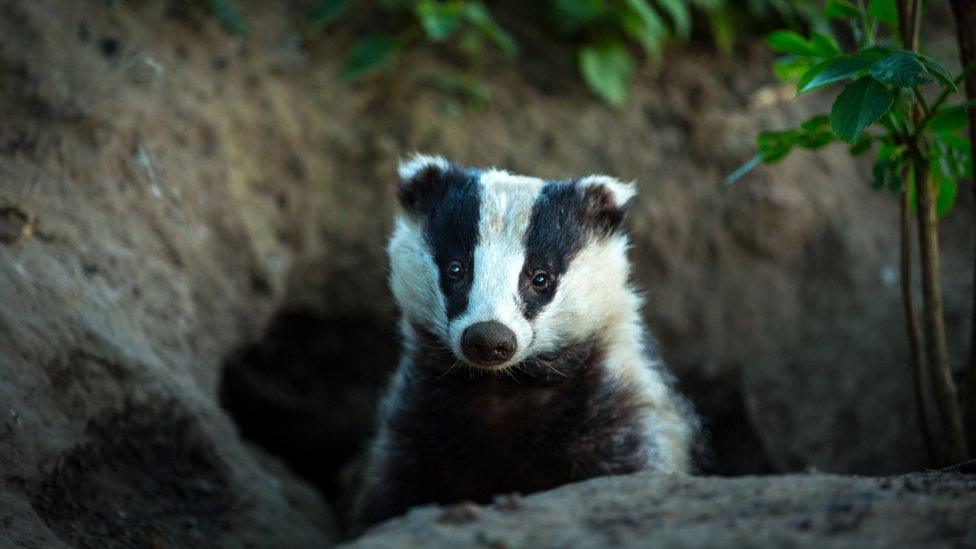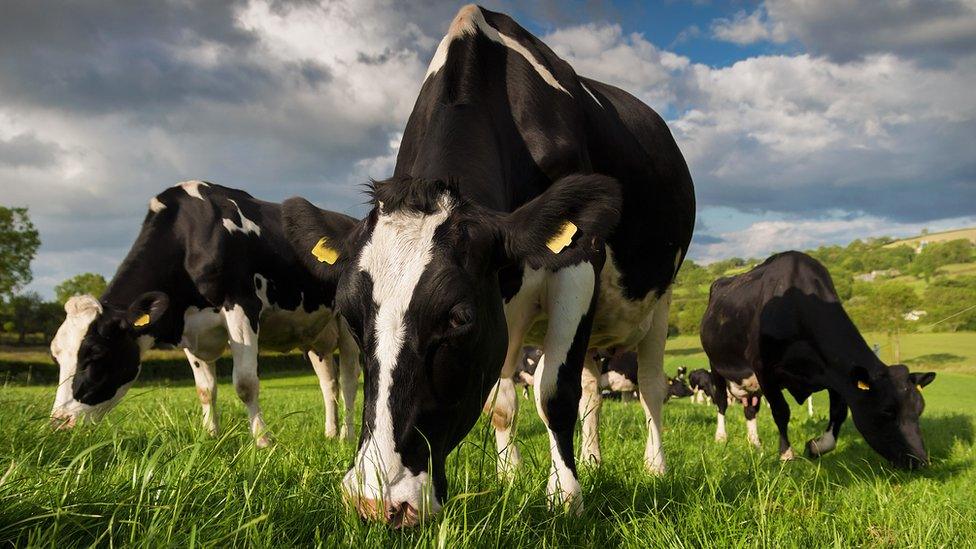Bovine TB: Edwin Poots calls for 'limited' badger cull
- Published

The minister says he wants to see a "limited cull of badgers"
Agriculture Minister Edwin Poots has said he wants to see a "limited cull of badgers" as soon as possible.
He made the remarks as he launched a new long-term bovine Tuberculosis (bTB) eradication strategy for Northern Ireland.
The minister told the assembly he wanted to create an "intensive programme" to reduce and ultimately eradicate the disease.
A number of wildlife charities have criticised the move.
"To eradicate bTB fully will take time," Mr Poots said.
"There isn't a quick fix. It will be a difficult and challenging process for all concerned. It will require strong, committed partnership between government and industry to see it through to ultimate success".
The minister said in the long term he wanted to see a move to a programme of badger vaccination and said his policy was not "anti-badger".
"This is not the wholescale removal of badgers across Northern Ireland," he said.
"It is not the eradication of badgers. It is not a shooting free-for-all and it is not anti-badger. It is a targeted intervention limited to those specific areas where badgers may play a significant role in the maintenance of bTB in cattle."
The minister referred to a number of farming families he had met who had faced bTB.
"The devastation left behind is unreal. We do need to realise that this is not just about the animals but the people who actually farm those animals," he said.
"The actual impact and trauma caused on them leading to some people taking their own lives.
"And therefore doing nothing again, is not an option".

Mr Poots told MLAs he wanted to create an "intensive programme" to eradicate bovine TB
Mr Poots set out three key areas the strategy would focus on. They are cattle measures, finance and funding and the role of wildlife.
Wildlife intervention is a controversial step and the minister acknowledged the opposition to the move.
"I'm aware that this is an extremely emotive matter with strongly held positions on both sides of the debate," he told MLAs.
"I want to assure you that I have considered the options presented to me - the scientific evidence, the experience of other jurisdictions, the robust analysis of the necessary business case, the responses to last summer's consultation and the environmental reports.
"Following this consideration I have decided the most cost effective and practical way forward is to implement a limited cull of badgers in specific intervention areas where there is a high incidence of bTB breakdown and a high density of badgers."
The cull proposed by Mr Poots is modelled on a badger cull carried out in England and was delivered by farmers who were specially trained.
The minister said he wanted the shooting of badgers to be carried out by "skilled and trained operatives".
He told MLAs that he would call for applications to the role from "farmer-led bodies that have necessary resources and expertise".
At present there are no such bodies in Northern Ireland.
Mr Poots said: "Shooters will be required to undergo specific training.
"Daera will carry out ongoing monitoring and evaluation ensuring high welfare standards are adhered to. The cost for on the ground delivery will be fully met by the new intervention farmer led bodies. But I have been asked by officials to explore if any other financial assistance can be considered".
'Unacceptable and unjustifiable'
A number of wildlife charities in Northern Ireland have reacted with dismay to the plans.
The Ulster Society for the Prevention of Cruelty to Animals (USPCA) campaigned against a badger cull, presenting a petition with 10,000 signatures to the assembly.
"This cull is completely unacceptable and unjustifiable," charity chief Brendan Mullan said.
"We have pointed repeatedly to roadkill statistics and DAERA's own TVR research project which indicates that 4 out of 5 badgers do not have TB. The department's actions will see the killing of thousands of healthy badgers and will be seen as nothing other than a wildlife catastrophe for Northern Ireland.
"We are of the view that this decision lacks the adoption of emerging science and research in tackling the disease. A recent study published in the official journal of the British Veterinary Association provided an extensive analysis of bTB incidence in England over an 11-year period and determined that, despite the culling of over 140,000 badgers, 'government data failed to identify any meaningful effect of the cull' on the prevalence of the disease in herds."
Mr Mullan also disputed whether a cull could be carried out humanely.
He said: "The Westminster government's own independent expert branded recent culls in England as 'inhumane and ineffective'.
"In fact, the same panel also highlighted just how inhumane this method is and how much unthinkable suffering it causes - more than 20% of badgers shot took up to five minutes to die. In no society should this be acceptable."

Bovine TB is an infectious disease which effects cattle
A Department of Agricultural, Environmental and Rural Affairs (Daera) official said the department had received a notice of legal action against the proposals.
While taking questions in the assembly, Mr Poots was asked why he did not bring the plans before the executive.
"I have taken legal advice on this as to what I needed to do," he said.
"We don't have a sitting executive at this point and I have no doubt that some people will wish to test this. But I have done what I needed to do".
Badgers are a protected animal in Northern Ireland and before any cull can take place there will need to be legislation passed by the assembly which is likely to take a long time.